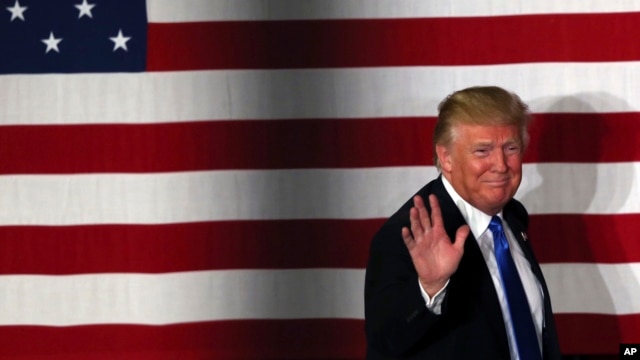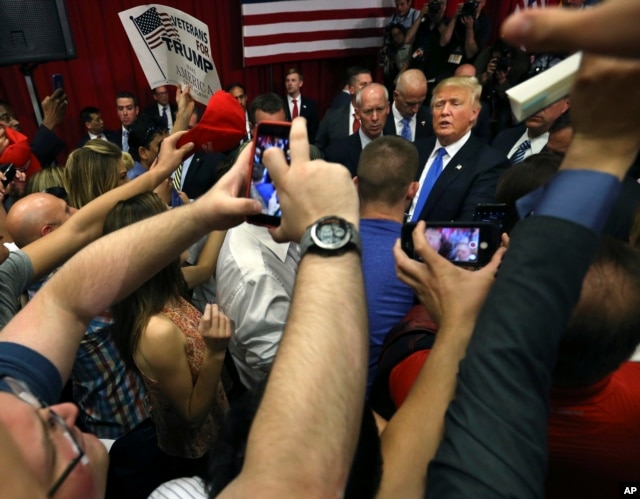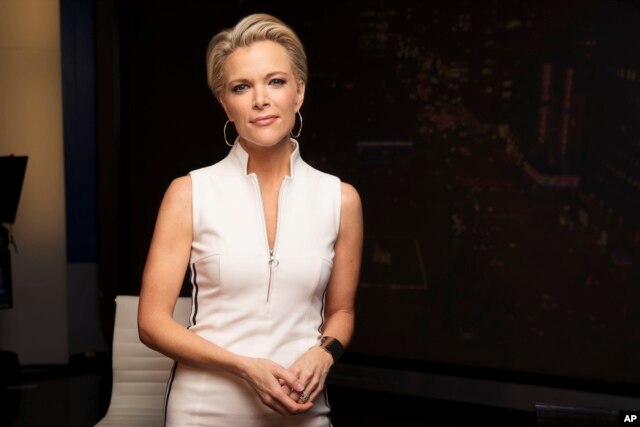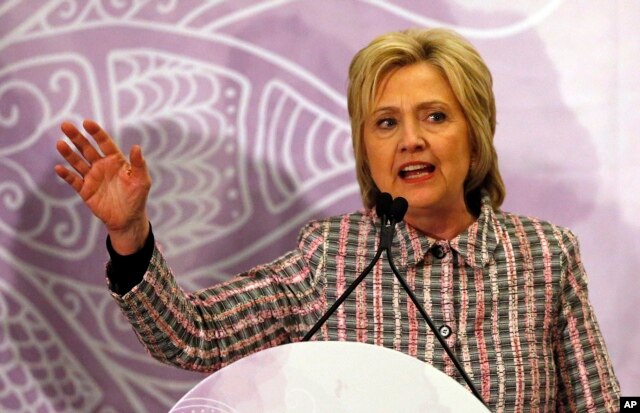Will Trump Reinvent Himself to Win US Election?
Republican presidential candidate, Donald Trump, waves during a campaign event in Lawrenceville, N.J., May 19, 2016.
Presumptive Republican presidential nominee Donald Trump seems to be making some headway in unifying the Republican Party behind him. Several recent national polls now show Trump in a dead heat with the expected Democratic nominee, Hillary Clinton, setting up a very close and potentially very nasty general election campaign.
The good news for Trump comes as the New York billionaire is in the midst of a bit of an image makeover, trying to make the pivot from outraged political outsider to a general election candidate acceptable to mainstream America.
“We are going to make America great again, greater than ever before,” Trump told supporters at a recent event in New Jersey. “And we are going to have a lot of fun and we are going to be respected as a country again!”
At times, Trump has adopted a softer tone where formerly he would be combative. He was nearly deferential in his recent interview with Megyn Kelly of Fox News when she recalled past Twitter exchanges in which he called her a “bimbo.” “Well that was a retweet, yes. Did I say that? Ooh, okay. Excuse me,” Trump said with just a hint of a sheepish smile on his face.
One of Trump’s earliest supporters in Congress, Representative Chris Collins of New York said recent exchanges with Republican lawmakers are paying off. “He’s collaborative, listening back and forth. That is who Donald Trump is and America is going to get very comfortable with that as we move on,” he said.
Trump has defied conservatives who warned his nomination would tear the party apart and Democrats who had hoped for the same thing. “I will have to say, to my surprise, the Republican Party seems to be mustering behind Trump in a way that sure didn’t look likely even a few weeks ago,” said noted conservative pundit Fred Barnes of the Weekly Standard. He was a guest on VOA’s “Issues in the News.”
Makeover challenge
But despite the signs of unity and his surge in the polls, some experts suggest Trump still has a long way to go to ease fears about his candidacy between now and November.
“Trump’s biggest problems, when you say what is negative about Trump to the American people, is his personality,” said Frank Newport of the Gallup polling organization. “He’s arrogant. He’s a wild man. He’s not controlled. He’s racist. He says things that he shouldn’t and regrets it later. That is what the public tell us.”
Even as he seeks to moderate his image, Trump has already focused his fire on likely Democratic nominee Hillary Clinton. “Can you imagine another four years of the Clinton’s, seriously? Can you imagine, seriously?,” he said.
Clinton remains entangled in a messy fight with rival Bernie Sanders, but also spends time trying to rebut Trump and offers herself as a candidate for national unity. “Let’s get on the American team and let’s act like Americans and let’s work together again,” Clinton told supporters in Kentucky.
Whether Trump succeeds in transforming himself from a blustering, undisciplined primary contender who scares and repels voters into a plausible presidential candidate who can appeal to moderates could determine the outcome of the November election. “Americans, I think at the end of the day, tend to be risk-averse when it comes to selecting a president,” said analyst William Galston at the Brookings Institution in Washington. “They may be dissatisfied with the status quo but the question is, whether the alternative represents a safe or safe enough alternative to the status quo. And the scarier Mr. Trump appears, the worse his prospects in November.”
A big part of Trump’s challenge is keeping his base happy while moderating and trying to broaden his appeal.
“If he’s able to keep the impolitic (blunt) character of his comments, which a lot of people on the right love, and yet at the same time to seem presidential, and I think that is the trick he is going to start to try to pull off,” predicted Michael O’Hanlon, a foreign policy analyst with Brookings.
Trump may be tempted to enjoy his success as the likely Republican nominee who came from nowhere to shock the political world. But the campaign is quickly shifting to a broader electoral landscape where Trump will have to prove that a message that has resonated so far with largely white Republican primary voters can withstand vehement opposition from women, minority and young voters
The good news for Trump comes as the New York billionaire is in the midst of a bit of an image makeover, trying to make the pivot from outraged political outsider to a general election candidate acceptable to mainstream America.
“We are going to make America great again, greater than ever before,” Trump told supporters at a recent event in New Jersey. “And we are going to have a lot of fun and we are going to be respected as a country again!”
Republican presidential candidate Donald Trump, center right, greets supporters after speaking at a campaign event, May 19, 2016 in Lawrenceville, N.J.
Softer toneAt times, Trump has adopted a softer tone where formerly he would be combative. He was nearly deferential in his recent interview with Megyn Kelly of Fox News when she recalled past Twitter exchanges in which he called her a “bimbo.” “Well that was a retweet, yes. Did I say that? Ooh, okay. Excuse me,” Trump said with just a hint of a sheepish smile on his face.
One of Trump’s earliest supporters in Congress, Representative Chris Collins of New York said recent exchanges with Republican lawmakers are paying off. “He’s collaborative, listening back and forth. That is who Donald Trump is and America is going to get very comfortable with that as we move on,” he said.
Trump has defied conservatives who warned his nomination would tear the party apart and Democrats who had hoped for the same thing. “I will have to say, to my surprise, the Republican Party seems to be mustering behind Trump in a way that sure didn’t look likely even a few weeks ago,” said noted conservative pundit Fred Barnes of the Weekly Standard. He was a guest on VOA’s “Issues in the News.”
Makeover challenge
But despite the signs of unity and his surge in the polls, some experts suggest Trump still has a long way to go to ease fears about his candidacy between now and November.
“Trump’s biggest problems, when you say what is negative about Trump to the American people, is his personality,” said Frank Newport of the Gallup polling organization. “He’s arrogant. He’s a wild man. He’s not controlled. He’s racist. He says things that he shouldn’t and regrets it later. That is what the public tell us.”
Even as he seeks to moderate his image, Trump has already focused his fire on likely Democratic nominee Hillary Clinton. “Can you imagine another four years of the Clinton’s, seriously? Can you imagine, seriously?,” he said.
Clinton remains entangled in a messy fight with rival Bernie Sanders, but also spends time trying to rebut Trump and offers herself as a candidate for national unity. “Let’s get on the American team and let’s act like Americans and let’s work together again,” Clinton told supporters in Kentucky.
Democratic presidential candidate Hillary Clinton speaks at the Trayvon Martin Foundation's "Circle of Mothers" Gala at the Embassy Suites Hotel on May 21, 2016 in Fort Lauderdale, Fla.
Embrace him or fear him?Whether Trump succeeds in transforming himself from a blustering, undisciplined primary contender who scares and repels voters into a plausible presidential candidate who can appeal to moderates could determine the outcome of the November election. “Americans, I think at the end of the day, tend to be risk-averse when it comes to selecting a president,” said analyst William Galston at the Brookings Institution in Washington. “They may be dissatisfied with the status quo but the question is, whether the alternative represents a safe or safe enough alternative to the status quo. And the scarier Mr. Trump appears, the worse his prospects in November.”
A big part of Trump’s challenge is keeping his base happy while moderating and trying to broaden his appeal.
“If he’s able to keep the impolitic (blunt) character of his comments, which a lot of people on the right love, and yet at the same time to seem presidential, and I think that is the trick he is going to start to try to pull off,” predicted Michael O’Hanlon, a foreign policy analyst with Brookings.
Trump may be tempted to enjoy his success as the likely Republican nominee who came from nowhere to shock the political world. But the campaign is quickly shifting to a broader electoral landscape where Trump will have to prove that a message that has resonated so far with largely white Republican primary voters can withstand vehement opposition from women, minority and young voters




No comments:
Post a Comment